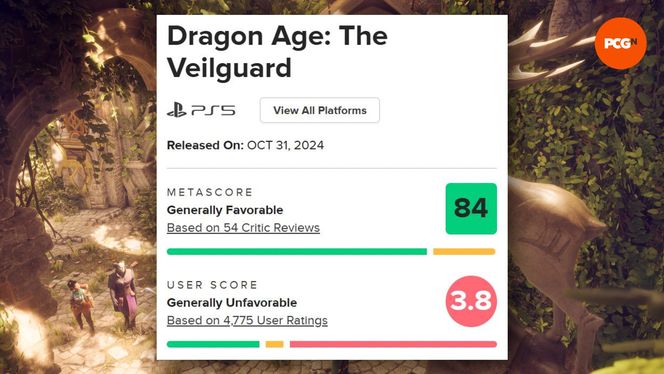Dragon Age: The Veilguard’s review bombing points out serious issues with Metacritic, and these problems aren’t going away anytime soon. Currently, the game has a user rating of only 3.8 out of 10.
Once again, review bombing has struck on Metacritic. This time, the target of the attacks is Dragon Age: The Veilguard; although BioWare’s RPG scored 84 out of 100 from critics (based on a total of 54 reviews), the user rating plummeted to just 3.8 out of 10 (from a total of 4,770 player reviews). The difference is stark, and we’ve already seen this pattern in other major game releases. However, Metacritic seems reluctant to address this issue.
A Free-for-All Criticism Zone
Most negative user reviews for Dragon Age: The Veilguard seem to respond to controversies that spread across social media before, during, and after the game’s release. “I was a fan of the franchise until I saw one of my favorite RPGs turn into a piece of ‘woke’ garbage,” writes DragonMaxBR. “Forced ‘woke’ themes and preaching completely ruin the immersive experience,” says benhrisdev. “Terrible dialogue and a ‘woke’ agenda. This is censorship at its worst,” adds HumarDean. While many players criticize the combat system, character design, or dialogue, the “woke” theme is frequently mentioned in comments.
On Metacritic, you don’t need to buy the game to review it. But do these criticisms appear on other review sites? Not at all. Looking at Dragon Age: The Veilguard’s performance on Steam, BioWare’s RPG currently holds a “Mostly Positive” rating of 74% based on 13,120 player reviews – a far cry from Metacritic’s 3.8 out of 10. Meanwhile, the PS Store shows a rating of 4.36 out of 5 based on 4,500 player opinions. This disparity largely stems from the fact that Metacritic doesn’t require game purchases to post reviews.
On Steam and the PS Store, as well as other platforms with community ratings, you must own the game to leave a review; exceptions exist, like receiving a free key (which is noted on the review) or leaving a review before requesting a refund. On Metacritic, however, this step isn’t necessary; anyone can log on and leave a review for an adventure. And Dragon Age: The Veilguard isn’t the only game to suffer from this approach.
One of the most notorious review bombings on Metacritic occurred with The Last of Us: Part 2. Despite receiving excellent ratings from audiences and the press, many players left negative reviews en masse on Metacritic; in just two days, the PlayStation title received nearly 30,000 player reviews, with a rating of 3.5 out of 10. Currently, Ellie’s journey holds a critic score of 93/100 (from 132 reviews) and a user score of 5.8/10 (from a total of 163,642 reviews). On the PS Store, PlayStation users rated it 4.47 out of 5 (from 197,000 reviews).
Metacritic and Reviews as a Form of Protest
Still, Metacritic isn’t the only place where players voice complaints about “woke” themes in Dragon Age: The Veilguard and other big releases; the community has also adopted review bombing on the site as a form of protest. In 2017, players left massive negative reviews for Star Wars: Battlefront II in response to microtransactions and loot boxes in the experience; in 2021, they did the same for Madden NFL 21 due to EA’s lack of updates; and even Animal Crossing: New Horizons received criticism in 2020 for limited multiplayer features in the weeks following launch.
In fact, Metacritic has become more influential than ever, and companies are obsessed with maintaining high scores. As such, companies don’t ignore Metacritic or other platforms’ review bombings; though they may not always address issues angering players, developers closely monitor any changes in their game ratings. Even GTA’s owners fear these kinds of situations; according to Strauss Zelnick, “hostile campaigns” can drive up marketing and advertising costs. This is why companies closely examine each shift in product ratings; necessary changes, however, often hinge on the nature of the reviews.
Moderation Tools Could Use an Overhaul
There’s a big difference between criticizing excessive microtransactions in a multiplayer title and complaining about Dragon Age: The Veilguard’s themes. On the one hand, as highlighted above, Metacritic’s key feature is a community of users who have actually purchased the game and express frustration over added microtransactions. On the other, as shown by the Steam and PS Store ratings, there’s a sizable group of users who, without playing BioWare’s RPG, still leave criticism on one of the industry’s most important sites.
“Our team reviews every report of abuse, and if violations occur, reviews are removed” (Metacritic). Is there a solution to this? You might think Metacritic would follow Steam, the PS Store, and other review platforms by requiring users to buy a game before leaving a review. However, the site’s owners appear unwilling to make that change; in fact, a brand spokesperson responded to the Dragon Age: The Veilguard review bombing by emphasizing that the system has tools to prevent mass-published reviews: “We take online trust and security very seriously across all of our sites, including Metacritic,” the representative told Eurogamer UK.
“Metacritic has a moderation system in place to monitor violations of our Terms of Service. Our team reviews all reports of abuse (including but not limited to racism, sexism, homophobia, insults toward other users, etc.), and if violations occur, reviews are removed.” Ironically, one of the latest negative reviews for Dragon Age: The Veilguard reads: “Okay, now they’re removing ‘bad’ reviews to stop us from telling the truth,” indicating that players are once again logging into the Dragon Age: The Veilguard page to leave more negative reviews, casting doubt on Metacritic’s moderation tools.
And Dragon Age: The Veilguard is only one of many games affected by Metacritic’s approach. Helldivers 2 has already shown that the community can achieve results with review bombing outside of Metacritic; the PSN account link requirement for the shooter and the issues arising from Arrowhead Game Studios’ 60-day plan sparked two crises that exploded within the Steam ecosystem, with negative reviews from the community. But in this case, the players are those familiar with the experience and demanding better service from Arrowhead and PlayStation.
Complaints surrounding Dragon Age: The Veilguard on Metacritic, and similar issues for future games, don’t reflect the real community of BioWare’s RPG. If anything, the Steam and PS Store ratings reflect genuine user opinions. But Metacritic either can’t or won’t improve its moderation tools or require game purchases before users can review. So what can we expect? To face the same situation with every game release that stirs up a bit of controversy.
Source: 3djuegos
















Leave a Reply